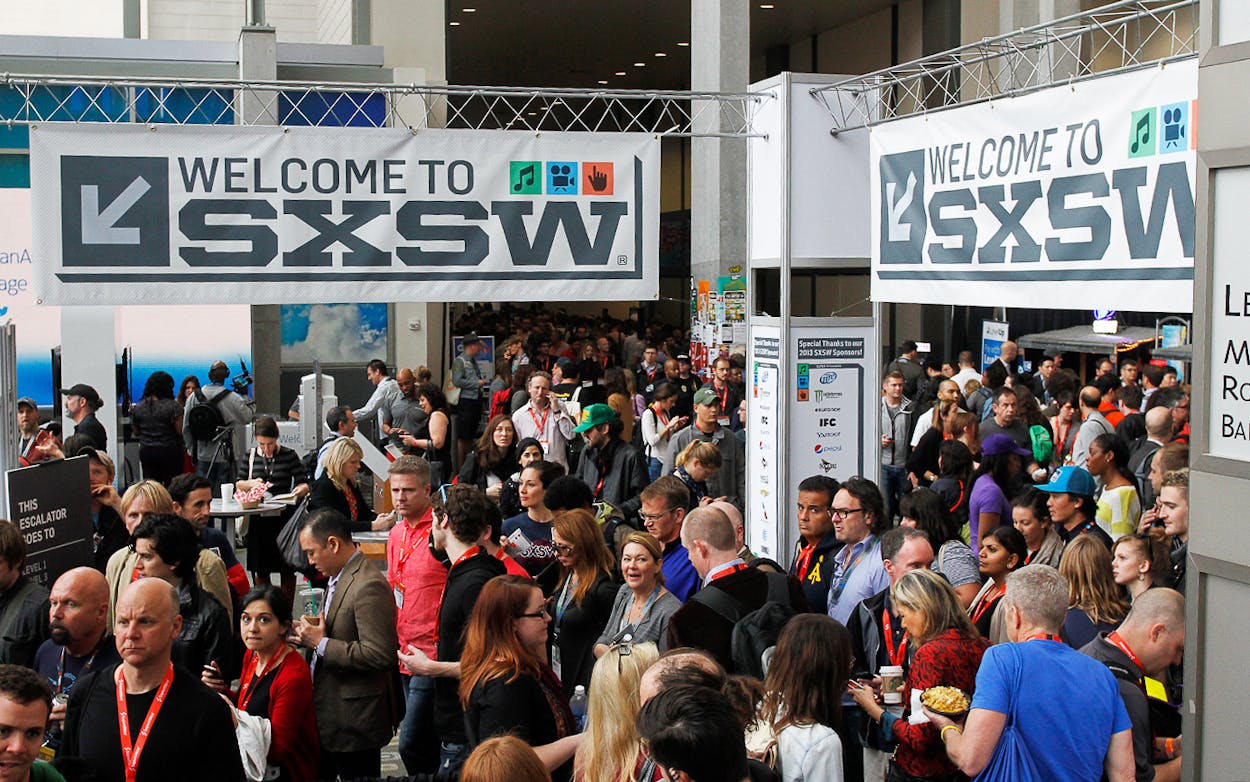Update 4:22 p.m: Austin mayor Steve Adler declared a state of disaster in Austin, thus canceling SXSW 2020.
South by Southwest 2020 is scheduled to begin in just over a week. The festival will bring a slew of big-name speakers and performers to Austin—from Hillary Clinton to St. Vincent, Ozzy Osbourne to Kim Kardashian West, Judd Apatow to Admiral William McRaven. Venues across the city are booked for events. (Editor’s note: Texas Monthly has an official SXSW event of its own this year.)
It’s also the subject of a Change.org petition which, at the moment, has nearly 25,000 signatures. The petition urges the festival—or maybe the city—to cancel the event amid fears surrounding the coronavirus outbreak that’s killed thousands and raised pandemic concerns around the globe. Twitter CEO Jack Dorsey, whose company has been closely associated with SXSW since breaking through at the festival in 2006, announced on Monday that he would be canceling his keynote due to coronavirus concerns.
Austin Public Health, the city government agency that oversees these issues, shared a statement on Monday that was posted to SXSW’s website, announcing that while it’s closely monitoring the situation, “there are no imminent plans to postpone any current events.” They also acknowledged that information and practices are rapidly changing. The festival’s COVID-19 page notes that while travel restrictions mean they’re not expecting anyone to come to Austin from China next week, they aren’t seeing wider cancelations yet. Most of the visitors to the festival, organizers said, are from countries such as Brazil, the United Kingdom, Germany, and Canada, which haven’t seen major outbreaks.
Still, there is an undeniable push among members of the public to take action. In a post on The Outline on Monday, a public health expert acknowledged that the festival’s rationale for moving ahead with the event is “not bad”; the writer nonetheless concluded that SXSW should be canceled this year. Why? Because the author finds it annoying. “The organizers of SXSW have a chance to be double heroes: not only could they possibly save lives by canceling their event, but they could save us all the inanity of hearing about it,” the post concludes.
Being annoyed by SXSW is, of course, a tradition nearly as old as the festival itself. In any given year, it probably wouldn’t be too hard to find 25,000 people willing to sign a petition urging its cancelation—just because they don’t like the hassle of an event that effectively takes over Austin for ten days in mid-March. But an awful lot of the Austin economy depends on the festival, and its cancelation would affect a lot more than just the attendees.
In 2015, I spent some time with folks who survive off of the SXSW shadow economy. These are caterers, pedicabbers, ride-hailing drivers, bartenders and servers, tech crew and security staff, and countless others who rely on SXSW as a windfall to pay off bills and get their heads above water each year. A whole host of bars and restaurants are able to weather the slow winter months because they know that, come March, rental fees and prepaid bar tabs will keep them afloat. There are plenty of large corporate hotels that might take a bath if they have to refund reservations for rooms they’ve doubled or tripled the rates on, sure—but the economy that’s built around SXSW is significantly more diffuse and working-class than that.
Canceling the festival in early March would leave a whole lot of people in a crisis. In addition to the paycheck-to-paycheck struggle of individuals, we would almost certainly see bars and restaurants close unexpectedly as a result of the decision. That would sweep away the jobs of all the people who work there—not just during SXSW, but for weeks and months after the festival is over.
SXSW isn’t just one of countless events that happen in Austin each year, like Austin City Limits or Willie’s Fourth of July Picnic. A not-insignificant sector of Austin’s economy was built to service the ten-day festival. Hotels and pizza places and portable-toilet rental companies have developed alongside SXSW.
Depending on what we learn and what public health officials say over the next few days, canceling the festival might end up being the right thing to do. It’s possible that in the next few days, a public health consensus will suggest that we need to take more extreme measures—not only around events like SXSW but also around, say, the NCAA Final Four or other public events likely to draw large crowds. At the moment, that’s still unclear. The World Health Organization issued an advisory on Monday suggesting that people over sixty or with long-term illnesses should avoid crowds to lower their risk of catching the virus, while the expert who spoke to The Outline noted: “if there’s a considerable amount of self-selection that attendees engage in whether they’re coming, given their personal exposure, then the odds are pretty good that it goes on without incident.” No one should stake the claim that economic concerns, real as they are for the people whose livelihoods are reliant on SXSW, outweigh health concerns. But right now, we don’t know that this is a choice between “help employees and restaurant owners make rent” and “keep people safe.”
Because the situation is evolving very quickly, we’re likely to know within the next few days if safety concerns eclipse the financial considerations of the good people and businesses of Austin. If that point comes, we’ll expect the city and the festival organizers to act swiftly to keep people safe. Until (and unless) it does, calls to cancel the festival carry very real risks for a whole lot of people in Austin, too.








